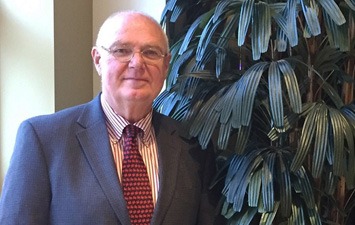“There is power within great sacrifice, within noble deeds. There are moments… brief, shining moments when the impossible becomes possible.” -Kelly Keaton
Classes are now in full swing in the Townsend School of Music at Mercer University. It has been a great start. Eager, wild-eyed in-coming students, combined with enthusiastic veterans, have created an energy and vitality that is sadly missed during the summer.
This past year was an incredible academic year that saw too many highlights to list. However, one that I am most proud is that TSM students received 2,413 credits for the academic year with an overall grade point of 3.559 on a 4.0 scale. 83.9 % of the students finished the year with an average of 3.0 or better. This is fantastic work by faculty and students, and I anticipate another great academic record this year.
I recently spoke to the music students at the Opening Convocation on the subject of heroes. Christopher Reeve, the actor who received stardom in the role of Superman, and became a quadriplegic after being thrown from a horse during an equestrian competition, had this to say: “A hero is an ordinary individual who finds the strength to persevere and endure in spite of overwhelming obstacles.”
Through research, I have found that there are numerous lists of heroes. History's Heroes list over 300 names. In order, the top five are Abraham Lincoln, Nelson Mandela, Leonardo da Vinci, William Shakespeare, and Mahatma Gandhi. There is also a list of Real Life Heroes who have changed the world. Among those include Oskar Schindler who is credited with saving the lives of more than 1000 Jewish people, Martin Luther King, an activist and humanitarian who led the advancement of the Civil Rights campaign, and Mother Teresa, who helped the poor, the wounded, and the sick. The American Film Institute has a list of the Top 50 Movie Heroes. Top among this list is Atticus Finch (To Kill A Mockingbird), Indiana Jones (Raiders of the Lost Ark), James Bond (Dr. No), Rick Blaine (Casablanca), and Will Kane (High Noon).
As a child growing up I had superficial heroes and “real heroes.” Batman and Robin, Superman, and James Bond were among my superficial heroes. My real heroes were the teachers who confronted, motivated, and inspired me to be more than I ever thought possible; my parents who cultivated and sacrificed for me so that I could follow my passion of music; a wife and children who understood that preparation and study of music was necessary if the performance was to be what it could be; and strangers who offered assistance in times of crisis.
An interesting hero emerged during the 2016 Summer Olympics: 18-year old swimmer, Yusra Mardini. Mardini, one of ten members of the Refugee Olympic Team, finished 45th in the 100-meter freestyle heats, some 12 seconds behind the winner.
Her heroism is found in the story of her effort to escape war-torn Damascus, her travels through Lebanon and Turkey, and the struggle to reach Greece. After leaving Turkey, she and nineteen others were on a small boat that was meant for only six people. When the engine failed, the boat began to experience trouble. Most everyone on the boat could not swim. However, Mardini, her sister, and two others jumped into the Aegean Sea and swam for three hours with one hand on a rope attached to the boat pulling the others to safety. No doubt, Mardini was a hero.
There are lessons all of us, and especially students in the Townsend School of Music, can learn from Yusra Mardini. (1) There are always times and events that occur that make us wonder if we can make it. Sometimes, it is just LIFE. Other times it may be a theory test, a term paper, a new piece to be learned—all of which may occur at the same time. What do we do? We just keep swimming. We take hold of the rope of our core value system and swim. (2) We can show up with our entire being. Mardini could not swim with hesitation. She had to give it all she had. The arts are so crucial to making life better that it is imperative that we bring all that we have. (3) Mardini “made a difference” by jumping in the water. In music, one cannot just put toes in the water to test it. One must jump in with the whole self. Music cannot transform lives IF we don't give it all we have.
This is part of the unique culture of the Townsend School of Music. Our faculty is dedicated to helping students learn to swim with their entire being. Sometimes currents will be strong and demands will be great, but for music to be transformative, students must learn to keep swimming. In doing so, they can become heroes for those who need a musical solvent for navigating through life, for those who need inspiration in dark moments to be uplifted emotionally, and for those who need “to transcend everyday states of consciousness that allows for relaxation, enhancement of the senses, expansiveness, and creativity.”
I want to invite you to join us in the Townsend School of Music as we see young heroes emerge from our talented students. It is a metamorphosis well worth watching and one that will enrich all.
David Keith , Dean
Townsend School of Music
Mercer University









